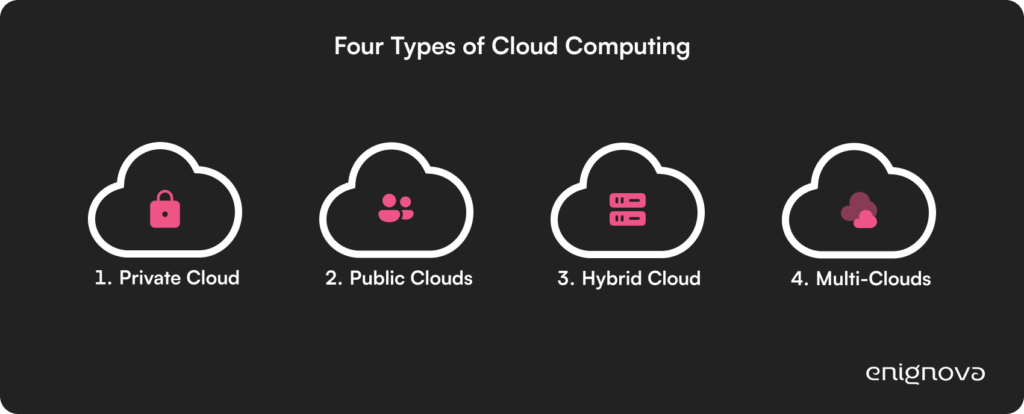

Four Types of Cloud Computing
1. Private Clouds
A private cloud is a type of cloud computing environment that provides IT infrastructure services to a particular user or organization. There is no interference from third parties in a private cloud. It can be further divided as follows:
Managed Private Clouds
Managed private clouds provide on-demand IT hardware and digital infrastructure to companies that use a private cloud model.
Dedicated Clouds
Dedicated clouds provide complete IT infrastructure for a single user in a public cloud environment. Therefore, it provides the features of a private cloud in a private cloud setup.
Advantages of Private Clouds.
- Provides advanced data security
- Makes disaster recovery and system management processes more efficient
Disadvantages of Private Clouds
- Companies have to incur a high cost to set up IT infrastructure for private clouds
- Maintenance cost is also high
2. Public Clouds
While private clouds provide computing services only to a single organization, public clouds are managed by third-party vendors that offer on-demand cloud computing services to multiple organizations. Some examples of public clouds are Google, Microsoft Azure, and Amazon Web Services (AWS).
Advantages of Public Clouds
- It is cost-efficient for small businesses as there is no need to set up IT infrastructure
- It offers easy maintenance and scalability
Disadvantages of Public Clouds
- Data security risk is higher in comparison to private clouds
- Offers limited flexibility and control to customers
3. Hybrid Clouds
Hybrid clouds allow the integration of private and public cloud features into a single IT infrastructure. It brings together private and public cloud environments from multiple vendors and provides users with a flexible and scalable cloud environment.
Advantages of Hybrid Clouds
- Hybrid clouds enable flexibility and enhanced data security
- Reduces the cost of setting up IT infrastructure
Disadvantages of Hybrid Clouds
- Creates a complex IT environment, leading to high operational expenses
- It is difficult to transfer data between public and private clouds environments in hybrid clouds
4. Multi-Clouds
Multi-clouds are often confused with hybrid clouds. Multi clouds bring together multiple public clouds from different cloud service providers, whereas hybrid clouds integrate the features of public and private cloud environments.
Advantages of Multi-Clouds
- It allows businesses to avail of a variety of cloud services from multiple vendors
- It reduces the risk of lock-in with a single vendor, thus enabling smooth operational flow.
Disadvantages of Multi-Clouds
- The inconsistent infrastructure creates bottlenecks in operational processes
- It poses high-security risks as several third parties are involved
